Books
Browse or search ANU Press' range of books or find out more about the publications' authors and co-publishers. Download the book for free or buy a print-on-demand copy.
Displaying results 721 to 730 of 786.

A Passion for Policy »
Essays in Public Sector Reform
Edited by: John Wanna
Publication date: June 2007
This collection of papers is concerned with issues of policy development, practice, implementation and performance. It represents a range of views about diverse subjects by individuals who are, for the most part, in the public eye and who have the capacity to influence the shape and the reality of public policy. Each has a story to tell, with insights that can only be drawn by those working at the ‘sharp end’ of policy.

Boats to Burn »
Bajo Fishing Activity in the Australian Fishing Zone
Authored by: Natasha Stacey
Publication date: June 2007
Under a Memorandum of Understanding between Indonesia and Australia, traditional Indonesian fishermen are permitted access to fish in a designated area inside the 200 nautical mile Australian Fishing Zone (AFZ). However, crew and vessels are regularly apprehended for illegal fishing activity outside the permitted areas and, after prosecution in Australian courts, their boats and equipment are destroyed and the fishermen repatriated to Indonesia. This is an ethnographic study of one group of Indonesian maritime people who operate in the AFZ. It concerns Bajo people who originate from villages in the Tukang Besi Islands, Southeast Sulawesi. It explores the social, cultural, economic and historic conditions which underpin Bajo sailing and fishing voyages in the AFZ. It also examines issues concerning Australian maritime expansion and Australian government policies, treatment and understanding of Bajo fishing. The study considers the concept of “traditional” fishing regulating access to the MOU area based on use of unchanging technology, and consequences arising from adherence to such a view of “traditional”; the effect of Australian maritime expansion on Bajo fishing activity; the effectiveness of policy in providing for fishing rights and stopping illegal activity, and why Bajo continue to fish in the AFZ despite a range of ongoing restrictions on their activity.

Electronic Engagement »
A Guide for Public Sector Managers
Authored by: Peter Chen
Publication date: March 2007
Over the last twenty years, advanced communication technologies have become pervasive throughout Western society. These technologies have not only revolutionised the delivery of public and private services, they have shaped consumers’ expectations about service quality.
This guide (written for managers who have an interest in expanding their approach to public engagement, rather than IT professionals) assesses the value that new communications and computing technology can bring to interactions with a range of potential stakeholders.
An engaging, provocative and thorough survey of available technologies and potential applications, this is a ‘must read’ for policy and program practitioners who are considering options for electronic engagement.

The Lexicon of Proto Oceanic »
The culture and environment of ancestral Oceanic society: 2 The physical environment
Authored by: Malcolm Ross, Andrew Pawley, Meredith Osmond
Publication date: March 2007
This is the second in a series of five volumes on the lexicon of Proto Oceanic, the ancestor of the Oceanic branch of the Austronesian language family. Each volume deals with a particular domain of culture and/or environment and consists of a collection of essays each of which presents and comments on lexical reconstructions of a particular semantic field within that domain.
Volume 2 examines how Proto Oceanic speakers described their geophysical environment. An introductory chapter discusses linguistic and archaeological evidence that locates the Proto Oceanic language community in the Bismarck Archipelago in the late 2nd millennium BC. The next three chapters investigate terms used to denote inland, coastal, reef and open sea environments, and meteorological phenomena. A further chapter examines the lexicon for features of the heavens and navigational techniques associated with the stars. How Proto Oceanic speakers talked about their environment is also described in three further chapters which treat property terms for describing inanimate objects, locational and directional terms, and terms related to the expression of time.
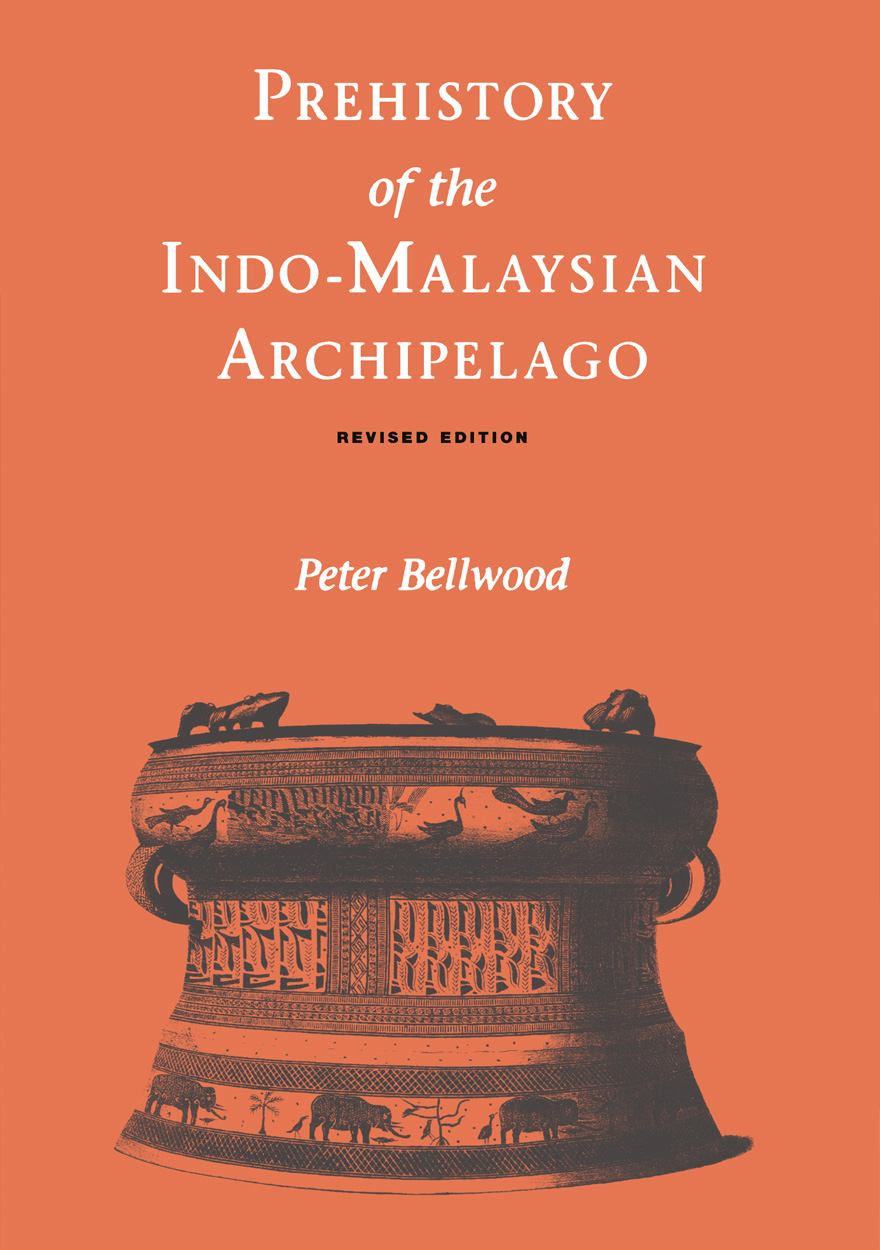
Prehistory of the Indo-Malaysian Archipelago »
Revised Edition
Authored by: Peter Bellwood
Publication date: March 2007
Since its publication in 1985, Peter Bellwood’s Prehistory of the Indo-Malaysian Archipelago has been hailed as the sole authoritative work on the subject by the leading expert in the field. Now that work has been fully revised and includes a complete up-to-date summary of the archaeology of the region (and relevant neighboring areas of China and Oceania), as well as a comprehensive discussion of new and important issues (such as the “Eve-Garden of Eden” hypothesis and its relevance to the Indo-Malaysian region) and recent advances in macrofamily linguistic classification.
Moving north to south from northern Peninsular Malaysia to Timor and west to east from Sumatra to the Moluccas, Bellwood describes human prehistory from initial hominid settlement more than one million years ago to the eve of historical Hindu-Buddhist and Islamic cultures of the region. The archaeological record provides the central focus, but chapters also incorporate essential information from the paleoenvironmental sciences, biological anthropology, linguistics, and social anthropology. Bellwood approaches questions about past cultural and biological developments in the region from a multidisciplinary perspective. Historical issues given extended treatment include the significance of the Homo erectus populations of Java, the dispersal of the present Austronesian-speaking peoples of the region within the past 4,000 years, and the spread of metallurgy since 500 B.C. Bellwood also discusses relationships between the prehistoric populations of the archipelago and those of neighboring regions such as Australia, New Guinea, and mainland Asia.
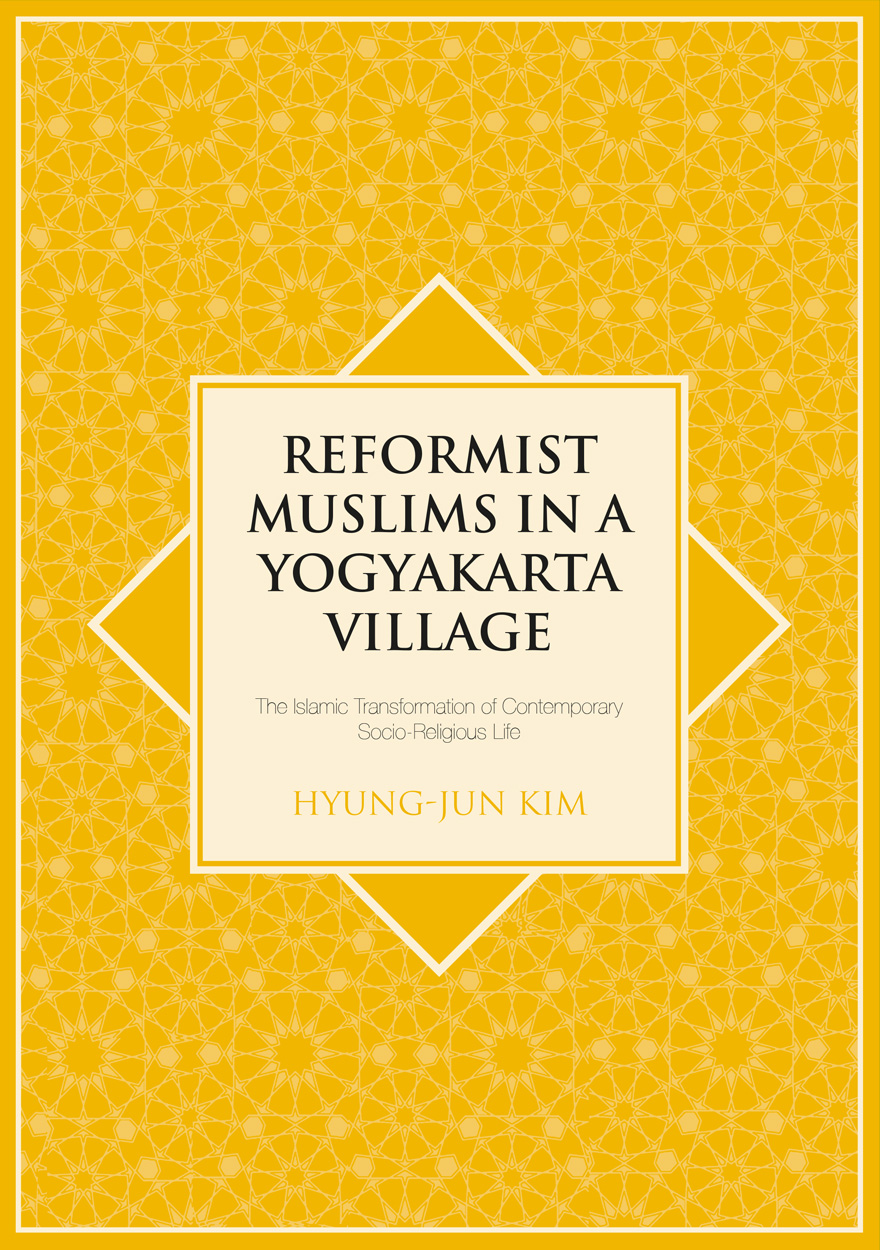
Reformist Muslims in a Yogyakarta Village »
The Islamic Transformation of Contemporary Socio-Religious Life
Authored by: Hyung-Jun Kim
Publication date: March 2007
This study examines the religious life of reformist Muslims in a Yogyakarta village. The foci of this discussion are on Muslim villagers’ construction, with the help of the reformist paradigm, of the image of the ‘good Muslim’ and ‘Muslim-ness’, on their efforts to incorporate an (reformist) Islamic framework to question taken-for-granted practices and ideas, on the position of traditional practices and ideas and their relation to reformist Islam, and on the interplay of villagers who show a strong commitment to reformist Islam with those who do not. Another topic investigated in this study is the interactions between Muslim and Christian villagers and the impacts of Christian presence on the process by which Muslims define themselves, their neighbours, their religion and their religious community.
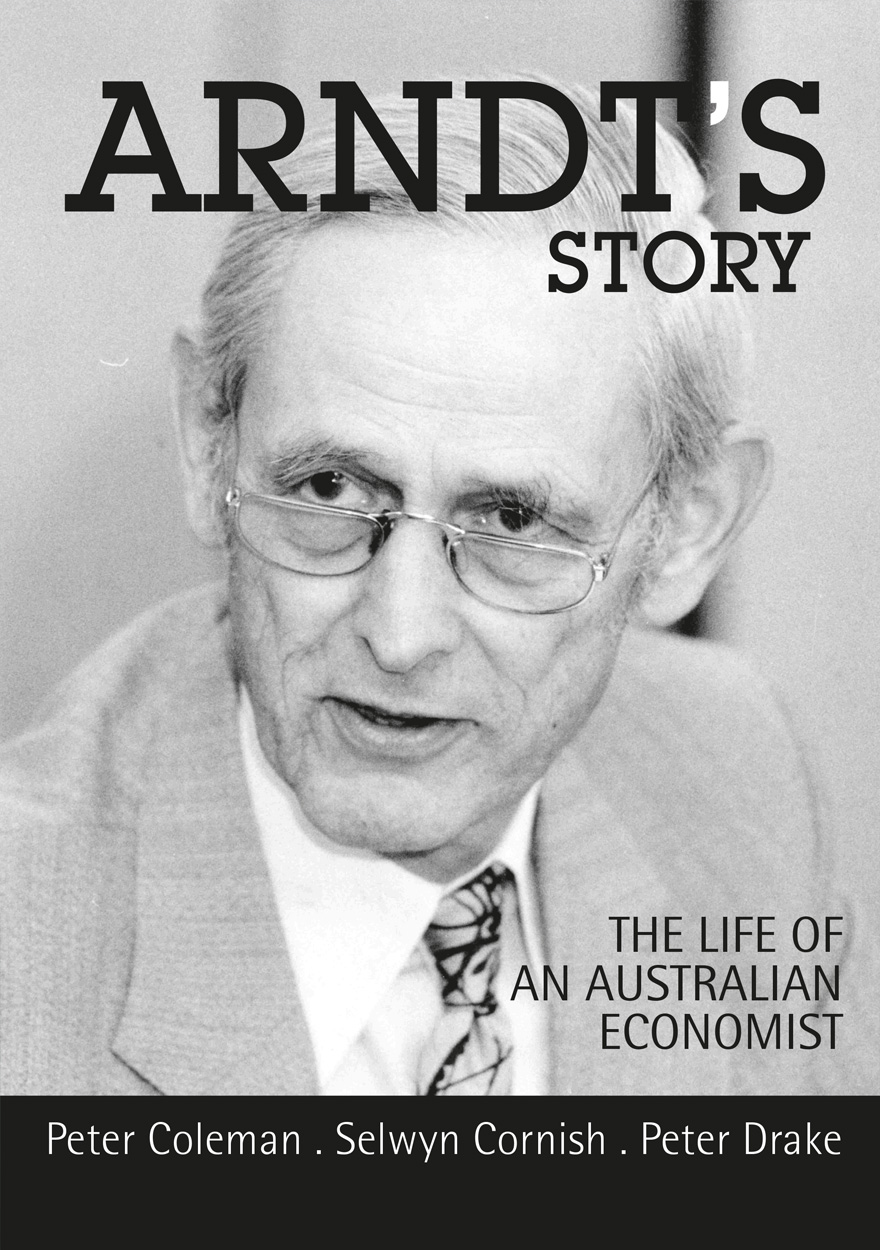
Arndt's Story »
The life of an Australian economist
Authored by: Peter Coleman, Selwyn Cornish, Peter Drake
Publication date: March 2007
‘H.W. Arndt has been Australia’s leading scholar of Asian economic development for over thirty years’
- Former World Bank President James D Wolfensohn.
The year of Heinz Wolfgang Arndt’s birth, 1915, was not a good time for a German boy to be born. His country was soon to be defeated in a great war, his school years were shadowed by the rise of Hitler. Yet when Heinz’s long-buried Jewish background led his academic father to lose his chair in chemistry and flee to Oxford, Heinz followed. As Heinz put it, the calamity of Hitler’s rise to power led him to ‘the incredible good fortune of an Oxford education and a life spent in England and Australia.’
This was a man of inexhaustible energy and optimism, who returned from months behind barbed wire interned in Canada to write a historical classic—The Economic Lessons of the Nineteen-Thirties. He seized the opportunity of an unexpected job offer to set off with his young family for Sydney where he quickly established himself as a leading authority on the Australian banking system, embarked on his fifty year career as a gifted university teacher and enjoyed the first of many vigorous forays as a public intellectual.
But it was at ANU that Heinz took the bold step which led him to become the Grand Old Man of Asian Economics. In 1966, just after the Sukarno coup and the year of living dangerously, he determined the time had come to study the Indonesian economy. It took all his charm, persistence and formidable intellect to persuade the Indonesians to open their doors to him. The result was a world-leading centre of Indonesian economics which greatly contributed to the development of modern Indonesia.
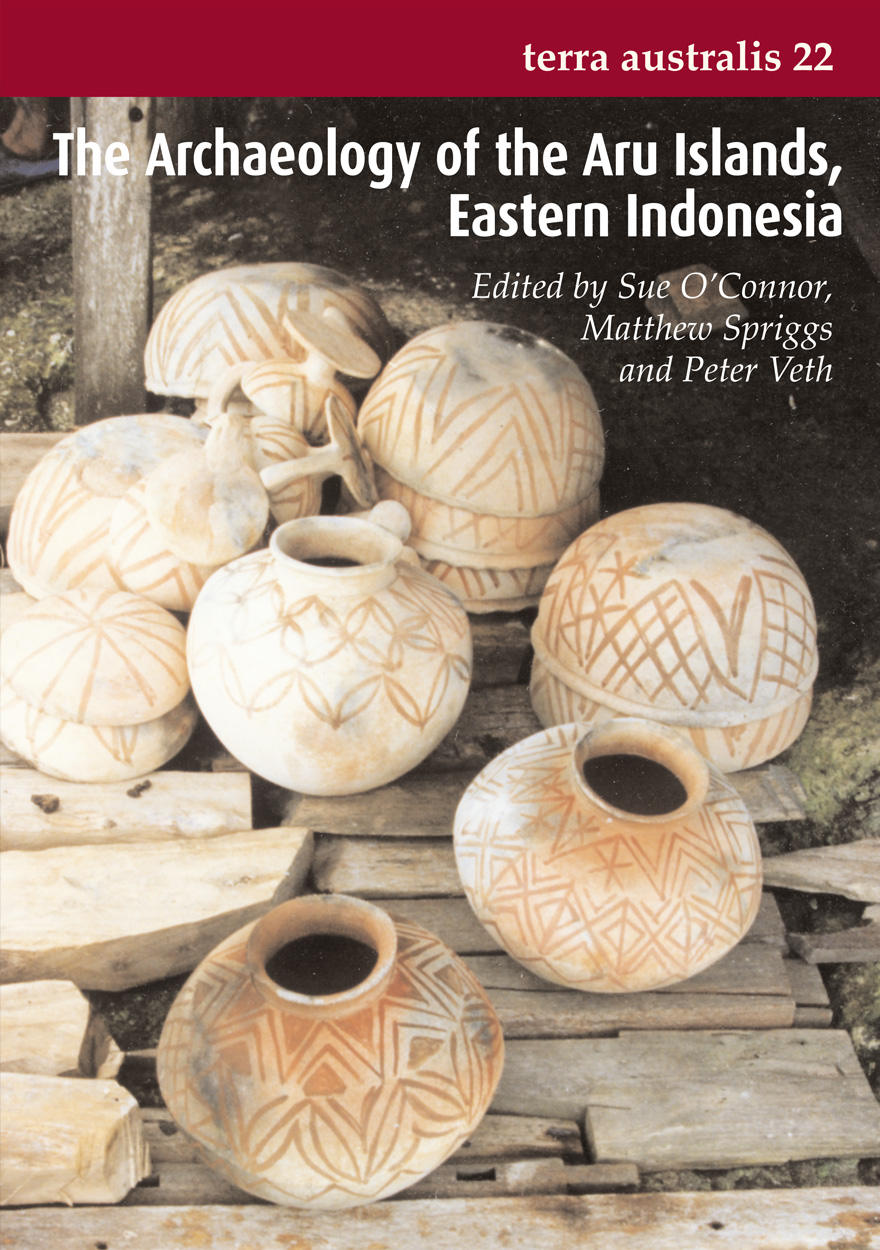
The Archaeology of the Aru Islands, Eastern Indonesia »
Edited by: Sue O'Connor, Matthew Spriggs, Peter Veth
Publication date: February 2007
This volume describes the results of the first archaeological survey and excavations carried out in the fascinating and remote Aru Islands, Eastern Indonesia between 1995 and 1997. The naturalist Alfred Russel Wallace, who stopped here in search of the Birds of Paradise on his voyage through the Indo-Malay Archipelago in the 1850s, was the first to draw attention to the group. The results reveal a complex and fascinating history covering the last 30,000 years from its early settlement by hunter-gatherers, the late Holocene arrival of ceramic producing agriculturalists, later associations with the Bird of Paradise trade and the colonial expansion of the Dutch trading empires.
The excavations and finds from two large Pleistocene caves, Liang Lemdubu and Nabulei Lisa, are reported in detail documenting the changing environmental and cultural history of the islands from when they were connected to Greater Australia and used by hunter/gatherers to their formation as islands and use by agriculturalists. The results of the excavation of the late Neolithic — Metal Age midden at Wangil are discussed, as is the mysterious pre-Colonial fort at Ujir and the 350-year old ruins of forts and a church associated with the Dutch garrisons.
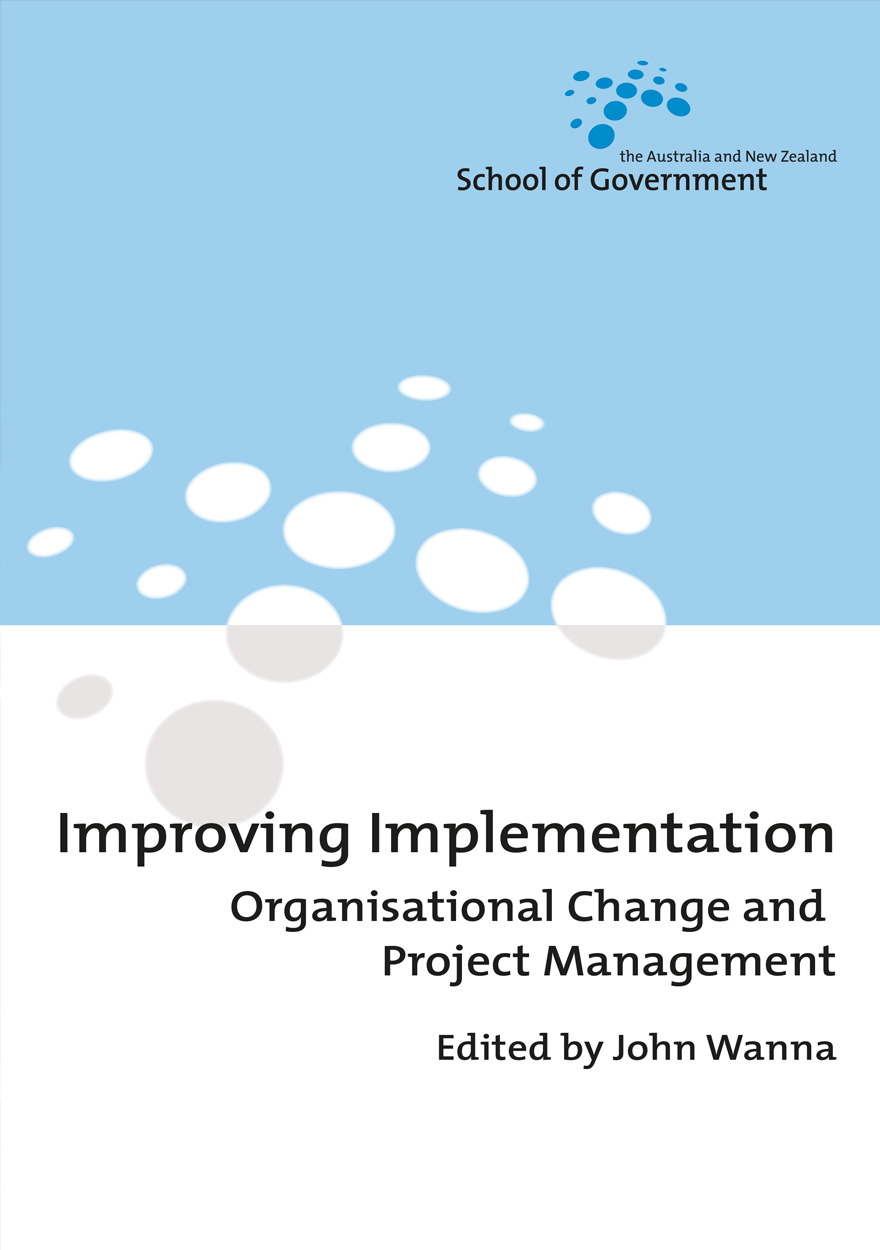
Improving Implementation »
Organisational Change and Project Management
Edited by: John Wanna
Publication date: February 2007
The business of government is necessarily diverse, changing and of considerable scale. A focus on improving the implementation of government programs and initiatives is important because the community expects the Government to deliver on its policies, as does the Government.
The papers included in this collection address numerous aspects of improving implementation. They were initially presented at the Project Management and Organisational Change conference held in Canberra in February 2006, the first annual research conference organised by ANZSOG in conjunction with the Department of the Prime Minister and Cabinet. This collection represents a comprehensive drawing together of experience and insight from both practitioners and academic researchers, with speakers including top public sector executives from the Australian jurisdictions as well as representatives from the United Kingdom, Canada and New Zealand.

Pieces of the Vanuatu Puzzle »
Archaeology of the North, South and Centre
Authored by: Stuart Bedford
Publication date: February 2007
Pieces of the Vanuatu Puzzle presents the results of the most intensive and widespread archaeological investigations in Vanuatu for more than 30 years. For the first time the results of extensive excavations carried out on three islands in the archipelago are published. The sites span from the period of initial Lapita settlement through to later cultural transformations. The research has brought greater clarity to the early history of the Vanuatu archipelago and has wider implications for the region in general particularly in terms of how processes of cultural change are explained.
It is an essential reference work both for those archaeologists working in the western Pacific but also for those who deal with material culture generally and pottery more specifically.



